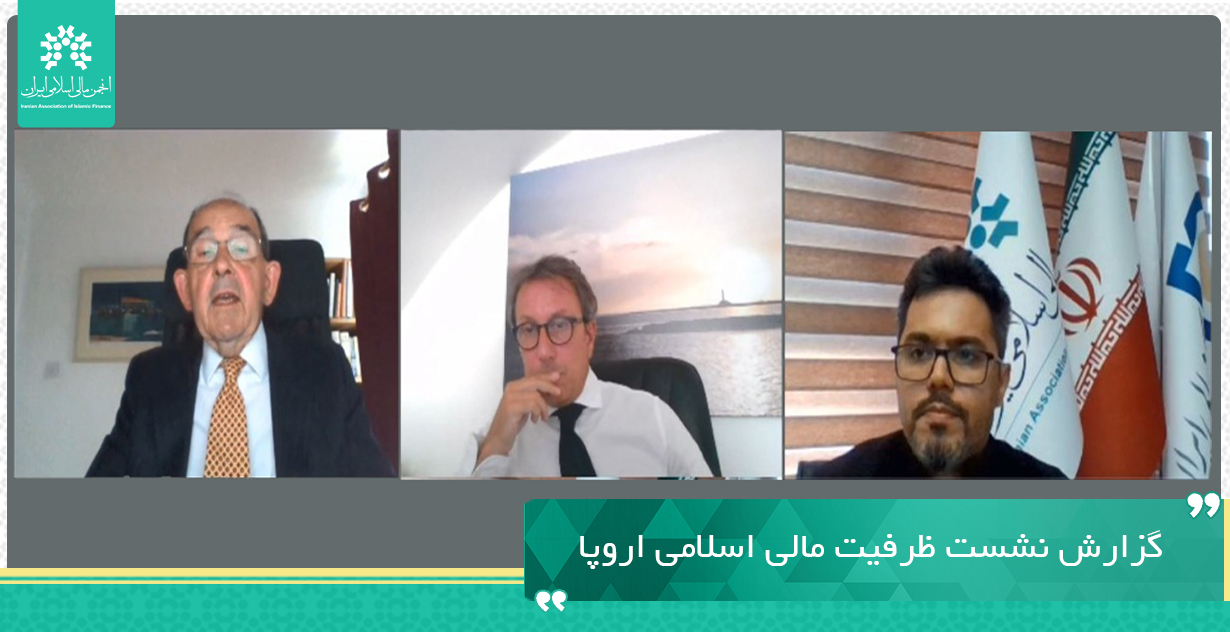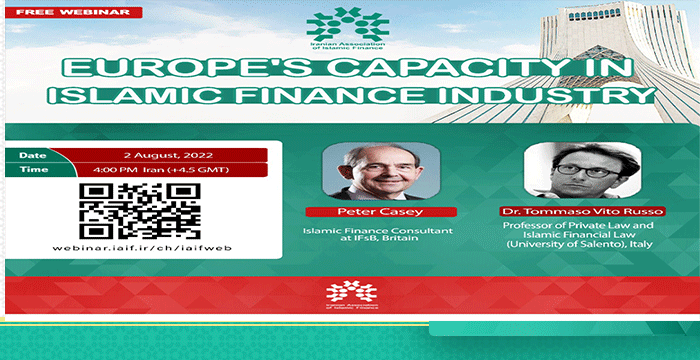

The Iranian Association of Islamic Finance held an international webinar on ‘Europe’s Capacity in Islamic Finance Industry’.
The Iranian Association of Islamic Finance held an international webinar on ‘Europe’s Capacity in Islamic Finance Industry’ on 2 August, 2022.
First Speaker:
Peter Casey from Britain, Consultant at IFSB
In the beginning of his presentation, he said very large amounts of financial services regulation are specified and/or implemented at European level; national discretion is very limited.
Moreover, some countries (e.g. France) have secularity embedded in their constitutions; some others had periods of Communist rule. So there are often obstacles to specific regulatory provisions for Islamic finance.
There are two basic reasons for developing Islamic finance:
1- To meet the needs of a domestic Muslim population.
2- To develop a position as an international center.
Regarding the Muslim populations and Islamic banking in Europe, Casey mentioned that Muslim majority countries are: Turkey, Kosovo, Kazakhstan, Bosnia & Herzegovina, Albania and significant minorities are (>10%) in North Macedonia, Bulgaria, Cyprus, Montenegro, and Russia, while only 4 countries have >0.1% Islamic banking: Turkey, Bosnia & Herzegovina, Kazakhstan, UK.
As to the features of Turkey in Islamic finance, the IFSB’s consultant made a remark that Turkey has large Muslim majority but secular constitution, Islamic finance is generally referred to as “participation finance”, its government has been encouraging growth, but Islamic banking still has only 7.8% market share, it is a significant sukuk issuer, but has a limited presence in Islamic collective investment schemes (ICIS), Islamic insurance has 5.6% but new more liberal definition may help, secular constitution makes it difficult to introduce specific provisions for Islamic finance and use of trade body, Participation Banks Association of Turkey, has provided some work-arounds.
As to the features of Bosnia & Herzegovina in Islamic finance, Casey stated that Bosnia Bank International was founded in 2000 by IsDB, Dubai Islamic Bank, Abu Dhabi Islamic Bank, this country has achieved just under 4% market share also acquired some Islamic microfinance.
As to the features of Germany in Islamic finance, Casey said it provides Islamic finance services for its Muslim minority (about 3.5%, mainly Turkish origin), much deliberation about whether an Islamic bank could be licensed, subsidiary of Kuveyt Turk eventually was licensed but has achieved limited traction and some other presence by German companies (e.g. Munich Re takaful), but largely operating outside Germany.
As to the features of Luxembourg in Islamic finance, Casey stated it is a capital markets player, based on its conventional strength and as an entry point for Europe, its main strength has proved to be in ICIS, where it holds 5.9% of global market, also it has some presence as a listing venue for sukuk and has worked within existing rules but has used open provisions.
As to the features of Ireland in Islamic finance, Casey stressed it is a capital markets player, based on its conventional strength and as an entry point for Europe, its main strength has proved to be in sukuk listings, also has some presence in Islamic funds and has made some tax adjustments based on those in the UK.
As to the features of the UK in Islamic finance, Casey mentioned it has provided Islamic finance services for its Muslim minority (about 4.4%, largely Indian Subcontinent origin) – but also its own capital markets strategy, the UK allowed Islamic banking (and insurance) within existing rules but made tax provisions to secure equality of treatment and offering liquidity management assistance, it has some other supporting provisions, e.g. on land registration and student loan equivalents and in the UK, Islamic banking and insurance have achieved limited retail traction, but have significant investment banking business.
UK’s position in sukuk listings has declined recently and London has a position as a center for commodities trading in support of Murabahah transactions.
At the end Peter Casey said there are weak preferences for Islamic finance:
1- Even in Muslim majority countries, the preference for Islamic finance appears relatively weak.
2- In Muslim minority countries, providers have struggled to gain market share against established conventional players – and distribution may be a problem.
3- Islamic finance will struggle to overcome any cost disadvantage.
Second Speaker:
Dr. Tommaso Vito Russo from Italy, Full Professor of Islamic Financial Law at Salento University
At the beginning of his speech, Russo said more than 90 percent of the Italians go to conventional banks to receive financial products, which is due to the lack of Islamic financial literacy. Moreover, Italian government levies 20 percent tax on some Islamic contracts which is really high.
Regarding Islamic Finance challenges in Europe, he mentioned all initiatives tend to be a country specific and Islamic finance in Europe is limited despite its potential.
As to the developments of Islamic finance in Europe, he stated Islamic finance is rather well established in London and Luxemburg (two of the four major sukuk-listing domiciles), Dublin importance for Islamic funds is raising and Initiatives to facilitate Islamic Finance are spreading.
About the prospects of Islamic finance in Europe, the professor of Salento University stressed potential demand for Islamic finance instruments is not negligible, there is a possibility to attract Funds from Middle East countries, there is potential for financial intermediation for international businesses and Islamic finance can be a complement to conventional banking and capital markets, not as substitute.
Regarding the European Market, Tommaso said more than 20 milion Muslims are in Europe so there is a need for new sources of liquidity and financing, business relationship between European and Middle Eastern Investors is increasing and there is a good demand of ethical investments.
Finally he referred to European Ijara Sukuk, going on to say that Sukuk issuance by Saxony-Anhalt (Germany) was in 2004 and the Ministry of Finance was the originator (owner) of the asset (buildings) leased properties to an SPV in consideration of receiving an amount equal to the Sukuk issue as a one-time advanced head-lease rental.
The SPV raised financing to lease the assets by issuing €. 100 million of Ijara Sukuk to investors. The amount raised by issuing the Sukuk is equal to the entire leasing price. The Ijara Sukuk represents equity interest in the SPV, and in turn, in the assets. The SPV leased the assets back to the seller/originator Ministry of Finance for 5 years.
The State has a direct obligation to pay lease rentals at periodic intervals which are passed on to the Sukuk holders as coupon payment of EURIBOR (flat).


